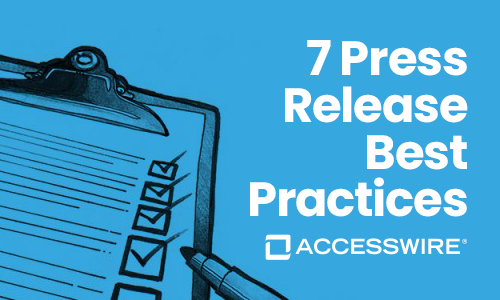PR for Small Business: Tips & Tactics
If you own or work for a small business, chances are you’re not making the most of your PR opportunities and might be wondering how to get press.
It’s a common misconception that only large, multimillion-dollar companies need to worry about PR. Such well-known brands thrive on visibility and often have recognizable leaders and spokespersons who appear with regularity on television and social media. For them, business is always done in public, meaning constant oversight and a recurring need for a PR professional’s expertise.
The truth is, however, that PR can be a powerful tool for small businesses as well. Start with a company press release to keep your customers and attract new faces. Whether you use it to grow or to show off your values and brand image to an industry target audience, public relations can offer limitless opportunities no matter your revenue or number of employees.
In this guide, we answer some common questions about PR for small businesses and offer useful tips and tactics to help you instantly elevate your PR effort and capabilities.
Do Small Companies Need PR?
Okay, so we might have already answered this one but the answer is a resounding yes. A solid PR strategy can be effective for any business, regardless of size.
Another way to frame the question is “What do small companies need PR for?”
Here are some benefits to keep in mind for PR for startups and small businesses:
- Increased brand recognition – By focusing on how your brand is perceived by the public, you stand to develop increased recognition of your image and the services you provide to clients and customers. Whether you’re just getting off the ground or looking to spark life into a longstanding operation, a PR strategy conducted by in-house professionals or a firm of your choosing can ensure you make the most of your brand.
- Promote your values – In today’s world, shoppers and clients want to support businesses that believe in something, stay active in their community, and use their voices whenever possible to promote a special cause. Maybe you support cancer research or a local housing initiative. Maybe your company participates in an annual holiday food drive. Whatever your business cares about, it’s important to use PR as a means of spreading that message. After all, 89% of shoppers proclaim their loyalty to brands that share values common with their own.1
- Get connected – It doesn’t take a computer scientist to recognize how interconnected the modern world has become. For a small business looking to expand its PR operation, connectivity means using technology to foster real human relationships wherever possible. PR allows you to make meaningful connections to leaders in your industry—and help those leaders become your colleagues.
- Attract new business – By getting the word out, you broaden your reach as a business and naturally attract the attention of new clients and customers. Alongside maintaining existing loyalties, attracting new business is the ultimate goal of any PR strategy. You might be launching an exciting promotion to give people a sample of the goods and services your company offers. Or, you may be aligning your brand’s values with a local or national initiative that will generate media buzz and show prospective clients that you care. Whatever your big plans, PR, make sure you have a plan for making it pay off.
How Do Small Businesses Get Their PR?
As is true for most business needs, the question of how to get PR will depend on your budget, your brand, your industry, and the size of your company. In other words, there’s no universal strategy for approaching PR, but that doesn’t mean you don’t have options.
In terms of personnel, a small business can either employ a dedicated PR specialist and, if necessary, assemble a public relations team, or it can outsource its PR needs with a firm.
The first option, while it could be more expensive, would be preferable for a business that both has the funds and regularly engages with partners, consumers, clients, and the community through a variety of resources. A dedicated PR team could provide a homegrown touch to industry newsletters, news stories, social media posts, and community initiatives. Their proximity to your company and its values would generate authenticity while ensuring consistency across all channels of communications.
If your business has more specialized PR needs or can’t afford to staff PR professionals on a permanent basis, you may seek the expertise of a PR consultant or firm to help shape a new strategy or promote an exciting new product.
Choosing Your PR Partner
Before selecting a PR agency to work with, it’s important to do your research, make comparisons, and assess both your budget and needs
- Be clear about what you want from the partnership. Establish trust early on by keeping lines of communication open at all times.
- Ask to participate in designing the strategy wherever possible, and don’t be afraid to make suggestions or offer new ideas. A PR agency can be a worthwhile resource for a small business on a budget, but the quality of your collaboration depends on your ability to work as a team.
- Keep your business involved by appointing someone from your own team to oversee their work and answer any questions that arise throughout the process. That way, you give the agency the independence they need to get the job done while keeping communication both active and straightforward.
What Is the Cost of PR for Small Businesses?
The median income for PR specialists in the US is $61,150.2 If you want to hire someone with more experience and seniority, a marketing director can demand an average annual salary of $93,447, while a senior public relations specialist could cost an average of $99,561 per year.3
It’s not exactly cheap, but if the reasons for having an in-house specialist or team listed above resonate with you, and if you have the budget to take on full-time PR representatives, then you should, by all means, do so.
In comparison, a consultant could cost an average of $26 per hour regardless of industry.4 If you’re looking to enlist the services of an agency, a low-end monthly retainer would range from $2,000-$5,000, while a top-notch provider could ask for between $20,000-$50,000 per month.5
For a small business that can’t quite commit to in-house PR, a qualified consultant and even an affordable PR agency could make sense in the long run.
The best part about PR, however, is that much of it can be free. By communicating within your industry, being an active member of your community, and maintaining a stable of loyal clients and customers, you can support your brand’s image and get new leads without hiring specialists and paying exorbitant retainers. Better yet, a calculated strategy blending self-generated PR with professional assistance can do wonders for your small business without necessarily breaking the bank either.
Useful Small Business PR Tips & Tactics
However you choose to conduct PR for your business, it’s important to know what tactics have been proven to succeed in a highly connected digital environment without sacrificing the human touch your customers and clients crave.
Here are some tips to take with you as you strategize and optimize your small business’s approach to PR.
- Nurture your online presence – Take time to work on your company website and digital PR efforts. Create a brand voice that fits your image and industry and use it across social media platforms. Set up Google Alerts to gather information on web traffic, such as the number of searches your company appears in and the kind of keywords that work. Last but not least, be online, but always be present. Allow your customers and clients to reach you and always be available for the next opportunity.
- Bring the media to you – Don’t wait for journalists or industry influencers to reach out to you. Arrange interviews with your leadership team in a respected industry publication. Contact editors with story ideas on how a new product will change your industry landscape. However you work with the media, it’s a good idea to assemble a media kit for them to consult for images, logos, and contact information.
- Be active in your community – A small business is only as strong as its local community. Staying active means organizing events, participating in fundraisers, and developing community-specific promotions to show your neighbors that you value people just as much as profit.
- Be a resource in your industry – As a small business, it’s important to understand your competition and act as a resource in your industry wherever possible. To do so, you can publish helpful blogs or videos that your industry would appreciate. If you want to be known as an industry leader, it’s crucial to act in a way that combines authority and approachability. A good PR strategy shouldn’t just focus on company profits. It should generate and sustain an image you want to present to the world.
- Remember to have fun – Last but not least, it’s important to recognize that PR doesn’t always need to be a serious business. Sure, it can help clear up a mistake or tackle bad press, but it can also be a way to express your small business’s creative side. Don’t be afraid to use humor, share interesting stories, or take part in lighthearted events. Utilize each PR tool to help your business stand out without compromising its values or sacrificing its respected industry status.
Find Your PR Partner in ACCESSWIRE
At ACCESSWIRE, we understand the value of corporate storytelling and have a proven reputation for helping small businesses with their PR needs. As you work to develop a strategy that fits your business, be sure to keep us in mind as a resource to turn to at any step of the process. Contact us to learn more about our press release service today!
Sources:
Indeed. 40 Public Relations Job Titles: Entry-Level, Mid-Level and Senior Roles.
Salary.com. Hourly Wage for ConsultantPublic Relations Salary in the United States.
SmallBizGenius. 50+ Eye-Opening Branding Statistics - 2021 Edition.
Tigrett. How Much Does PR Cost and What to Expect.
U.S. News & World Report. How Much Does a Public Relations Specialist Make?
Similar Blog Posts
PRODUCTS
ACCESSWIRE | All Rights Reserved




